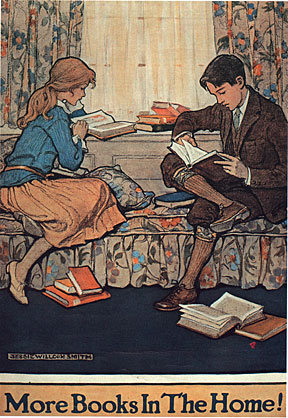The Power of Stories
I read this story on the NPR site last week, and it reinforces how transformative stories can be, whether heard or read. This is not likely to be news to anyone who reads this blog, but it’s a thought-provoking article just the same that summarizes a longer interview with a scientist discussing the effects of stories on the brain. (I listened to the interview as well.)
At first glance, I thought of my mother. She is in a nursing home, and I’ve noticed that reading to her stimulates a very different response than most other efforts to converse. It seems to sharpen and focus her attention. She laughs at all the right places, reacts in other ways (“Oh my gosh!” at surprising twists), and stays quietly focused, watching the face of whoever is reading.
The last story I read her was one we’d enjoyed a few years ago, before she was admitted — a funny, rollicking tale by Wendell Berry called “Turn Back the Bed.” The experience illustrated this article’s claims: listening to a story activates the brain’s regions that process emotion, and it can bring the brain into the same rhythms as the reader. With an author like Berry, I always think of how a graduate school classmate remarked, “Wendell Berry’s prose slows you down.” His fiction does too. He writes with thoughtful precision, and his long habit of writing poetry manifests itself in sound and rhythm. For someone whose inner thought-world is chaotic or confused, even the sound of his narrative being read has the beneficial effect of slowing and clarifying the mind.
I also thought of my students, for the article reminds us that one’s predictive faculties are stimulated by a story. We continually guess at, and revise, predictions about what’s going to happen next. In Small Teaching, James Lang explains how brain science can be incorporated in practical ways in the classroom, and his chapter on prediction encourages teachers to give students an opportunity at the start of class to make a prediction about something to be examined. At the end of class, let them return to it and see how “right” they were. This simple exercise facilitates better retention and retrieval of what was learned that day.
Naturally, I thought of myself as well. In the last year or so, I’ve listened to more audiobooks for myself (in contrast to those I’ve listened to with my children over the years). This is partly because it’s easier to deal with than a physical book when using our elliptical, and certainly much less life-threatening when riding a bike! Listening and reading cultivate different skills, and I value them all. Reading involves, for me, deeper concentration; the words on the page are stricter and don’t allow me to wander off into my own thoughts. But listening demands more short-term memory, since I can’t flip a few pages back to reread. Listening is also somehow more social, as the character of the reader’s voice gets into the mix. When reading a book, I have an internal voice that doesn’t call attention to itself in the same way, so there is a certain delicious solitude.
None of this is new. That’s why stories are so intertwined with human history. If science is finding its own ways of affirming the power of narrative, it’s about time.



